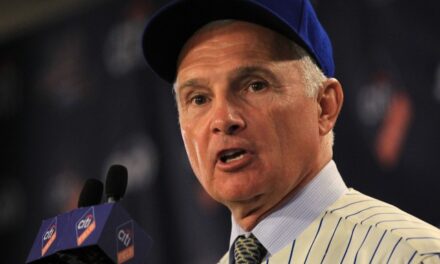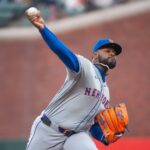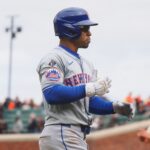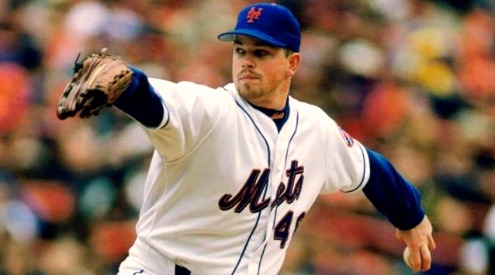
In September 1999, the Kansas City Royals and the New York Mets made what was at the time an unheralded trade.
The teams swapped pitchers, both of whom were late-round picks in their respective drafts, with the Mets sending 25-year-old right-hander Dan Murray to Kansas City for 24-year-old left-hander, Glendon Rusch.
Murray would appear in only 14 games between 1999-00 for the Royals, while Rusch gave the Mets 63 starts between 2000-01 (65 games total), posting a 3.65 FIP with 7.6 strikeouts-per-nine. He contributed out of the pen in every round of the playoffs in ’00, posting a combined 1.08 ERA over six games.
One of his most memorable moments came in Game One of the ’00 World Series, where in the 10th, Dennis Cook proceeded to walk the first two Yankees with the score tied at three.
Manager Bobby Valentine turned to Rusch, the fourth reliever used that night.
A wild pitch to Tino Martinez moved the runners up to second and third, the winning run only ninety feet away. Rusch buckled down, getting Martinez to pop up to deep short for out number one. An intentional walk to Jorge Posada loaded the bases and set up the potential for a double-play to get out of the inning.
With Paul O’Neill stepping up to the plate – who posted a .836 OPS against lefties in the regular season – the situation was bleak.
On the first pitch of the at-bat, Rusch delivered an 88 mph fastball on the inner half of the plate that O’Neill chopped to second, forcing the inning-ending 4-6-3 double play.
For Rusch, seeing his teammates celebrate in the dugout is forever ingrained in the veteran lefty’s memory.
Gutsy is one word that often describes what the six-foot-two left-hander offered a team. Valentine once said at a Q&A that of all the players he’s managed in his career, Rusch was one of the gutsiest, and the label fits.
Not blessed with a blazing 95 mph fastball, Rusch, like recent veteran Mets starter Bartolo Colon in the latter part of his career, relied more on guile, location and mixing in his pitches to keep hitters off-balance.
After the ’01 season, Rusch was dealt in a massive three-team deal with eleven players changing uniforms with the Colorado Rockies and Milwaukee Brewers. From 2002-09, Rusch was utilized both as a starter and out the pen, appearing in 215 games, 106 of which were starts.
Following his retirement from baseball, Rusch worked with young baseball players as the co-founder at Full Count Baseball Academy in Pasadena, California.
In 2015, the San Diego Padres hired Rusch to be the pitching coach for their Class-A affiliate in Lake Elsinore. Rusch spent three seasons with the Storm, and saw progressions each season from his pitchers. In 2015, the Storm was dead last in ERA (5.21) and WHIP (1.58) in the California League, however, in 2016 and ’17, Lake Elsinore placed 5th and 3rd respectively in ERA.
While the 12-year veteran hopes to get a chance to coach in the majors someday, he decided to take the 2018 season off to be with his family, which includes two young sons.
His jovial personality and passion for the game make him an undeniable fan favorite, as that mid-September trade with Kansas City ended up a steal for the Mets.
I had the privilege of speaking with Rusch earlier in the month, where we discussed his trade to the Mets in ’99, his postseason play and his thoughts on the Mike Piazza/Roger Clemens feud.
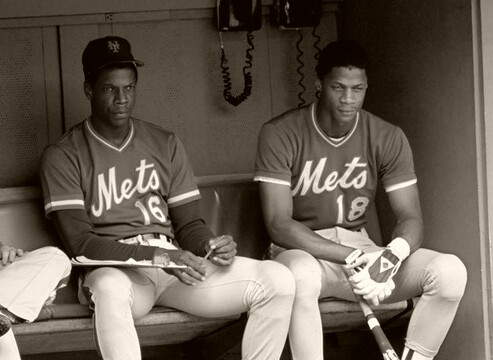
MMO: Who were some of your favorite players growing up?
Glendon: I grew up in Seattle, so I was a big Ken Griffey Jr. [fan]. My other two guys were Mets actually, Darryl Strawberry and Dwight Gooden.
MMO: Besides pitching, what other positions did you play as a kid?
Glendon: I played first in high school. That’s where you’re stuck when you’re a left-hander.
MMO: At about what point did you start focusing on pitching during your youth?
Glendon: I pitched all the way up through youth leagues and everything. I would say by the time I was a junior in high school I was pretty dialed in with pitching.
MMO: You made your major league debut against the Minnesota Twins on April 6, 1997. You went eight innings, allowing just two runs (unearned) with four strikeouts. What are some of your memories from that day?
Glendon: I just remember being extremely nervous and excited at the same time. I definitely remember my legs not being underneath me when I was out there stretching and warming up. Once the game started I was okay. But yeah, that’s a nerve-wracking time when you make your debut.
MMO: What were your initial thoughts when you heard that you were traded to the Mets in September of 1999?
Glendon: I was a little bit overwhelmed. Leaving Kansas City, the team that drafted me, and going from a team on the younger side to an extreme veteran team [which] that ’99 team had. I was by far one of the youngest guys in that clubhouse when I walked in there. Needless to say, [I was] a little overwhelmed.
MMO: Fans hold that 2000 team in high regard, as you guys seemed like such a fun-loving, close group. Was that team as close-knit as it appeared on the outside?
Glendon: It was, it was a great crew. It definitely was a mixed crew with veterans, a handful of young guys like myself, [Jay] Payton, [Benny] Agbayani, etc. You go on the road and there would be 15-20 guys going out to dinner together. Yeah, it was a great crew.
I really learned a lot, enjoyed that a lot and made some really good friends out of it.
MMO: There were several light-hearted moments from that season. One of the funniest being Robin Ventura dressing up as Piazza during a rain delay at Yankee Stadium. Are there any moments you can share from that year that you remember fondly?
Glendon: The one that I always go back to is I remember spending a lot of time talking with Eddie Coleman from the FAN on flights and in-between games. One of the fun moments we had, I believe it was after we won the pennant, I hopped on as Glendon from Queens like a caller and had some fun with him.
That Ventura moment was unbelievable. I’ve watched that so many times since, it’s hilarious.
MMO: That’s great! Looks like you took a page out of the Mike Francesa playbook when it comes to prank calling on the FAN.
Glendon: Oh yeah, absolutely! You know, it was such a great place and I think the FAN probably was at its peak during those years. It was so fun to listen to. I mean, you had to have some thick skin but it was fun to listen to.
One day you’re Cy Young, and the next day, they’re ready to throw you out on the LaGuardia tarmac. [Laughs.]
MMO: The 2000 season was one of the best statistical years of your career (3.50 FIP, 111 ERA+ over 190.2 IP). Were there any particular factors that helped contribute to such a successful season?
Glendon: I think everything just kind of came together. I had some confidence. A lot of it revolves around the mental aspect of it, being confident in what you’re doing. I had a few hundred innings under my belt in Kansas City, and I had an opportunity with a very good team. As the season progressed, they kind of showed more and more confidence in me and believed in what I could do.
It’s nice when you’re cruising behind the guy’s in our rotation that we had, with [Al] Leiter, [Mike] Hampton, [Rick] Reed and Bobby [Jones] and those guys. It kind of made my job a little bit easier in the five-hole to come in and do what I did.
MMO: Over the years, with pitch framing gaining more mainstream attention, Mike Piazza’s defense behind the plate has started to get more praise than in years past. In your experience, how was Piazza as a catcher?
Glendon: He was great with me. I’d have to look back and see how many games I threw to who (Rusch had Piazza as a backstop for 42 games), but when he was in there for me he did a good job of making me use my fastball and working off of that. Using both sides, I think I pitched in probably better than I ever have before, on the inner half of the plate and that was partly due to his game-calling. It was great.
MMO: Speaking of Piazza, you were on the mound for the second game of the day/night doubleheader against the Yankees in July, when Piazza was initially hit in the helmet by Clemens. In the bottom half of the second, you hit Tino Martinez in the rear with a pitch. What do you recall from that game and moment?
Glendon: It was only the second time in my career I’d ever been a part of a situation like that, where you had to go out and defend your teammate. And oddly enough, the time it happened to me before was the same exact situation; it was my catcher getting hit in the head with a pitch. It was Chris Turner getting hit in the head by Juan Guzman, if you remember him from Toronto.
It gets the adrenaline going because you know something could happen, something might happen. I think Tino being the pro he was, knew what was going on and nothing else happened after that.
It was scary to see Mike though. I remember going up the tunnel into the training room to go and see how he was doing after he got hit, and he was out of it.
It was a scary moment. I would say if you see that now, seventeen years later, with the concussion protocol and everything else that we have, he might’ve been out a lot longer than he was.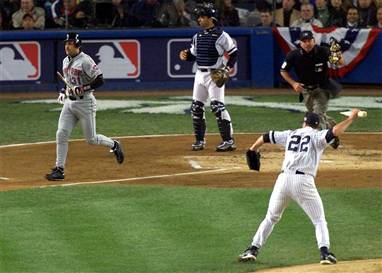
MMO: Looking back, do you feel that the Clemens/Piazza feud was handled well in Game Two of the World Series?
Glendon: I think it was probably handled the best it could’ve been at that point in time. The last thing you want to do in the World Series is clear the benches and have someone get hurt, or have someone get suspended when you’re in the middle of that Series. We couldn’t afford to lose anybody. I know they got their issues out but I don’t know.
Regular season, I think it’s probably a different story. We’d probably still be out there going at it.
MMO: You appeared in three of the five World Series games, with two standing out. Your Game One appearance with two men on and no out in the 10th, and your two scoreless innings in Game Four. What stands out for you most from those games, and how difficult is it to keep your composure in such crucial moments of the game?
Glendon: I really don’t know how I did, to be honest with you. That was probably, still to this day, the scariest game I’ve ever come in. It’s almost like a lose-lose situation when you come in with two guys on and nobody out in a tie game on the road, where any way they score it’s over. I was able to get out of that.
One of my best memories that I remember from that was when they turned the double play and we got out of that inning is seeing the excitement from Bobby M. Jones and Pat Mahomes practically jumping over the railing at Yankee Stadium as I was coming off the field. I still remember that part from this day.
Then pitching again in Game Four was great. It was two great innings and kept the game close. Those were some tight games that I think we lost four games by a total of five runs in that Series. It could’ve gone either way, we couldn’t score off their bullpen, that’s really what it boiled down to.
MMO: I recently saw a video clip where your former manager, Bobby Valentine, describe you as one of the grittiest players he ever managed. What was your relationship like with Bobby V.?
Glendon: Bobby and I kind of had a special relationship because when I got there, I was so naive to being in New York full time, that I really didn’t have a place to stay! [Laughs.] I was staying at the Marriot by LaGuardia and eventually, he kind of helped me find a place up in Connecticut. Him being from Stamford, he helped me settle in and be comfortable there.
He kind of played a little bit of a father figure/mentor to me on top of being my manager, so I always had a great relationship with him and we got along really well.
MMO: Do you still keep in touch with any of your teammates from the ’00 season?
Glendon: I hear from guys occasionally, yeah. Occasionally I would see Matt Franco. I talk to Todd Pratt once in a while, [and] Vance Wilson I would see. Mahomes I still talk to.
I haven’t heard from Mike [Piazza] in a while. Ventura and [Todd] Zeile I would see every year, they would play in my golf tournament out in California. So yeah, I would say a good amount of guys I still keep in touch with.
MMO: Looking back at your 12 years in the majors, besides the postseason with the Mets, what moments stand out most for you?
Glendon: Hitting homers! [Laughs.] I was lucky enough to hit three homers. Those I’ll never forget because that was the most fun I had being in the National League was going up to the plate. I’ve always loved the National League game, it gives you a true meaning of what it’s all about to be a part of the game in a fit fully, not just being a pitcher.
Obviously, my debut. There’s been a lot, pitching in the playoffs with the Mets was amazing and there’s a lot of good things but all of those kind of stick out for me.
MMO: You played for six different franchises during your career. What team(s) would you say you identify most with?
Glendon: I would say definitely the Mets and Cubs. Mets because of what we did there as a team, I loved it, I loved New York. The people of New York were extremely good to me just in the couple of years I was there.
The longest tenure was in Chicago, three years. It was supposed to be four but I had a blood clot [in 2007]. The Chicago people were great, too. I still see them occasionally and go back to the Cubs Convention which is fun.
MMO: You’ve been a pitching coach in the Padres organization for the last three seasons. Do you have a specific pitching philosophy, or do you gear it more towards an individual basis?
Glendon: Definitely towards each individual guy. Kind of the main bullet points you always go through is pitching ahead, pitching inside, and doing everything you need to do as a solid pitcher.
The guys were awesome, I had so much fun doing that the last three years. It was neat to see, especially this year because I started to see some of my guys get to the big leagues, some of the guys that I had over the last three years. It’s really fun to see them get to fulfill their dream by making it to the big leagues.
MMO: Have you thought about the prospects of becoming a major league pitching coach someday?
Glendon: You know, I have. I’m going to take a little break from it now. My family and I just moved to a little bit north of Louisville in Kentucky; we left California after a long time. As of right now, I’m going to stay home with my wife and my two boys and be a dad for a while. I kind of put the coaching part on hold starting next year.
I’ve got a fourth grader and an eighth-grader, so I don’t want to miss out on too much more. Coaching is great but it’s also probably more time-consuming, even more than it was when you’re a player. It’s a lot of work but definitely worth what you get. The reward by helping guys and especially, baseball’s kind of made a shift in the last, I don’t know, five to ten years of probably more non-baseball guys as far as front office and coaching. So, to actually have guys on your staff that played in the big leagues and have that true experience that they can lend their knowledge with I think makes a big difference.
MMO: With teams utilizing analytics like never before now, how involved were you and the Padres organization with incorporating sabermetrics into your coaching?
Glendon: We were, yeah. Baseball’s such a subjective game that you don’t know what can happen. You don’t know if your pitcher executes a pitch if he doesn’t execute a pitch, what the hitter does and everything else. You can have as much information as you want but still, at the end of the day it still boils down to your gut and I think this year it showed a bunch in the World Series.
You look at the way AJ Hinch managed a couple of those games this year. When he saw one of his relief guys dominating, he didn’t make a move just to make a move because his book said to make a move. He went off his gut a few times and let those guys go. And he ended up winning the World Series. I wouldn’t say just because of that, but it’s interesting when you see both sides of the coin and that’s an organization in Houston that’s very much involved with sabermetrics and everything else. He kind of had the best combination of both, I thought.
I always go back to a guy that I absolutely love and loved playing for, Dusty Baker. I’ve heard his comments multiple times saying he might not outsmart you but he’s going to motivate his guys to play their best for him. That’s not always the case, he’s obviously a very smart baseball guy and a very good manager, but it just shows that dotting the “X”s and “O”s on the chalkboard doesn’t always work because sometimes baseball is baseball and your gut shows you which way to go.
MMO: Thanks so much for your time, Mr. Rusch. It was great to reminisce about your career.
Glendon: Thanks, Mathew.
Follow Glendon on Twitter, @GlendonRusch


